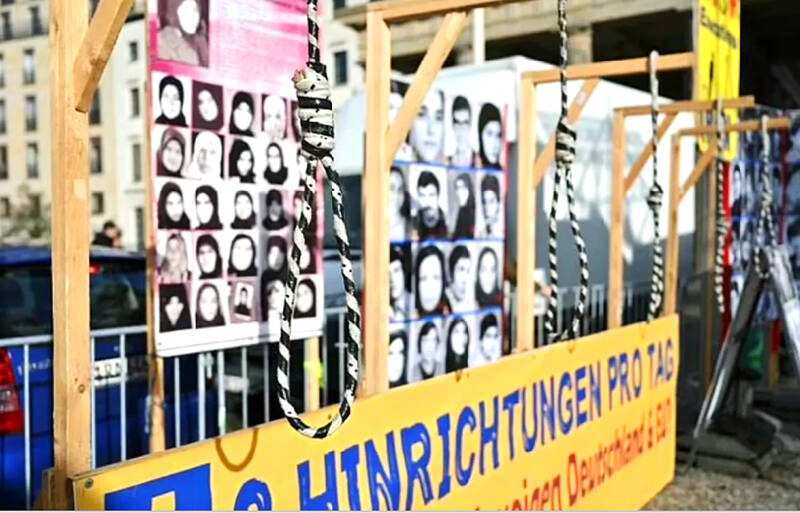Iran executed at least 975 people last year in a “horrifying escalation” of its use of capital punishment, two human rights groups said yesterday.
Norway-based Iran Human Rights (IHR) and French group Together Against the Death Penalty (ECPM) said that the figure was the highest since IHR began recording executions in Iran in 2008.
The figure “reveals a horrifying escalation in the use of the death penalty by the Islamic republic in 2024,” they said in a joint report, accusing Iran of using the death penalty as a “central tool of political oppression.”

Photo: AFP
“These executions are part of the Islamic republic’s war against its own people to maintain its grip on power,” IHR director Mahmood Amiry-Moghaddam said. “Five people were executed on average every single day in the last three months of the year as the threat of war between Iran and Israel escalated.”
Last year’s figure represented a 17 percent increase on the 834 executions recorded in 2023, the report said.
Of the 975 people executed, four people were hanged in public and 31 were women, also the highest figure in the past 17 years.
Human rights groups, who say that Iran is the world’s most prolific executioner after China, accuse the authorities of using the death penalty to sow fear among the public, particularly after nationwide protests broke out in 2022.
Capital punishment remains a key pillar of the Shariah-based judicial system established after the 1979 revolution ousted the Western-backed shah.
Crimes punishable by death include murder, rape and drugs offenses, but also more vaguely worded charges such as “corruption on Earth” and “rebellion,” which rights advocates say are used against dissidents.
In the past few years, executions have been carried out by hanging, mostly in prison yards, but occasionally in public, although other methods remain on the statute books.
Two of last year’s executions were in connection with nationwide protests that erupted in September 2022 after the death in custody of Mahsa Amini, an Iranian-Kurdish woman arrested for an alleged breach of Iran’s mandatory dress code.
Mohammad Ghobadlu, 23, was executed in January last year on charges of killing a police officer with a car during a protest in October 2022.
Human rights groups have charged that his trial was deeply flawed, with judges ignoring evidence presented by the defense that he had bipolar disorder.
Gholamreza Rasaei, 34, was executed in secret in August last year on charges of killing a Revolutionary Guard during a 2022 protest.
Rights advocates said that his confession had been obtained by torture.
The rights groups said there was evidence Iran might have carried out more executions last year that they were unable to confirm for their report.
They said there were reports of an additional 39 executions last year that they had been unable to corroborate through second sources.
Already this year, Iran has carried out at least 121 executions, according to IHR’s count.

VAGUE: The criteria of the amnesty remain unclear, but it would cover political violence from 1999 to today, and those convicted of murder or drug trafficking would not qualify Venezuelan Acting President Delcy Rodriguez on Friday announced an amnesty bill that could lead to the release of hundreds of prisoners, including opposition leaders, journalists and human rights activists detained for political reasons. The measure had long been sought by the US-backed opposition. It is the latest concession Rodriguez has made since taking the reins of the country on Jan. 3 after the brazen seizure of then-Venezuelan president Nicolas Maduro. Rodriguez told a gathering of justices, magistrates, ministers, military brass and other government leaders that the ruling party-controlled Venezuelan National Assembly would take up the bill with urgency. Rodriguez also announced the shutdown

Civil society leaders and members of a left-wing coalition yesterday filed impeachment complaints against Philippine Vice President Sara Duterte, restarting a process sidelined by the Supreme Court last year. Both cases accuse Duterte of misusing public funds during her term as education secretary, while one revives allegations that she threatened to assassinate former ally Philippine President Ferdinand Marcos Jr. The filings come on the same day that a committee in the House of Representatives was to begin hearings into impeachment complaints against Marcos, accused of corruption tied to a spiraling scandal over bogus flood control projects. Under the constitution, an impeachment by the

Exiled Tibetans began a unique global election yesterday for a government representing a homeland many have never seen, as part of a democratic exercise voters say carries great weight. From red-robed Buddhist monks in the snowy Himalayas, to political exiles in megacities across South Asia, to refugees in Australia, Europe and North America, voting takes place in 27 countries — but not China. “Elections ... show that the struggle for Tibet’s freedom and independence continues from generation to generation,” said candidate Gyaltsen Chokye, 33, who is based in the Indian hill-town of Dharamsala, headquarters of the government-in-exile, the Central Tibetan Administration (CTA). It

China executed 11 people linked to Myanmar criminal gangs, including “key members” of telecom scam operations, state media reported yesterday, as Beijing toughens its response to the sprawling, transnational industry. Fraud compounds where scammers lure Internet users into fake romantic relationships and cryptocurrency investments have flourished across Southeast Asia, including in Myanmar. Initially largely targeting Chinese speakers, the criminal groups behind the compounds have expanded operations into multiple languages to steal from victims around the world. Those conducting the scams are sometimes willing con artists, and other times trafficked foreign nationals forced to work. In the past few years, Beijing has stepped up cooperation